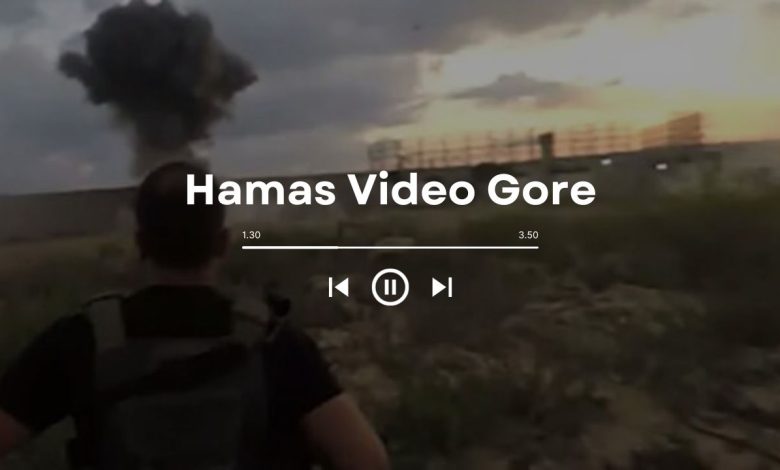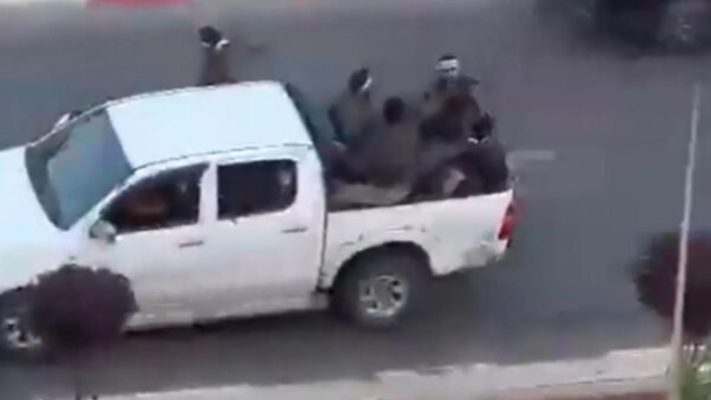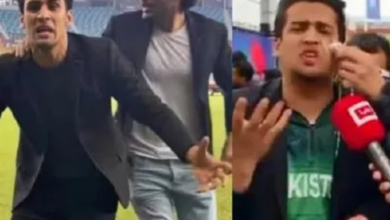
As torrents of graphic content depicting the devastating effects of missiles and rockets tear through social media, Reddit and Twitter are flooded with images of bodies torn apart. Videos tagged as “Hamas video gore” and “Israel attack” clips are triggering outrage and horror as the Israel-Palestine conflict rapidly escalates. This online battleground amplifies real-world tensions, with both sides weaponizing social media to shape narratives and provoke reactions. Each distressing post pushes Palestine and Israel closer to the brink of all-out war instead of a peaceful resolution. Rational discourse erodes as propaganda and misinformation poison the conversation. Instead of uniting humanity, social media is tearing us apart along tribal lines. Platforms like Reddit and Twitter have become polarized battlefields where the voice of peace struggles against waves of hatred. Will compassion ultimately triumph over vitriol, or will the delete key merely bring forth another wave of destructive conflict? Stay updated by following Nowviralvideo.com!
Contents
- I. Reddit and Twitter: Unveiling the Horrors of Hamas Videos and Israel’s Military Responses
- II. Decoding ‘Hamas Video Gore’: Exploring the Nature of Disturbing Content
- III. Online Circulation of Hamas Attacks: Shock, Outrage, and Trauma
- IV. Impact on Viewers: Navigating the Emotional Aftermath of Conflict Footage
- V. Analyzing Reddit and Twitter Discussions: Unraveling the Israeli Military Response
- VI. Pro-Palestinian Sentiment and Israel Critique: Voices Amplified on Social Media
- VII. Defense of Israel’s Actions: Countering Condemnation in the Digital Sphere
- VIII. In the Digital Trenches: Understanding the Israel-Hamas Conflict’s Social Media Landscape
I. Reddit and Twitter: Unveiling the Horrors of Hamas Videos and Israel’s Military Responses
The recent outbreak of conflict between Israel and the Palestinian militant organization Hamas has been prominently featured on social media platforms such as Reddit and Twitter. Hamas Video Gore and images depicting actions from both parties have gained significant traction, leading to widespread expressions of anger and heated online discussions.
1. Brief Overview of the Israel-Hamas Conflict
The conflict between Israel and Hamas is deeply rooted in the longstanding Israeli-Palestinian dispute that spans several decades. Hamas currently holds authority over the Gaza Strip, a Palestinian region that has been under Israeli occupation. Over time, Hamas has frequently initiated rocket assaults on Israel, while Israel has enforced limitations on Gaza and carried out military campaigns in the area.
Recent weeks have witnessed a surge in tensions, primarily sparked by Israeli security actions at the Al-Aqsa mosque complex in Jerusalem. These tensions swiftly escalated into the ongoing series of rocket attacks and airstrikes, resulting in a death toll of over 200, with the majority being Palestinians.
2. Recent Attacks and Escalation: A Snapshot
On May 10th, Hamas initiated an extensive rocket attack directed at Jerusalem and various Israeli urban areas, leading to Israel’s retaliation through airstrikes on Gaza. Subsequently, the conflict has escalated, with Hamas launching more than 3000 rockets, while Israel has conducted numerous airstrikes.
Israel has deployed ground troops in the vicinity of Gaza and activated thousands of military reservists in preparation for a potential ground incursion. Despite efforts by the UN Security Council to encourage a cessation of hostilities, they have thus far been unsuccessful in mediating a ceasefire.
3. Social Media: The Epicenter of Updates and Debates
Amidst the escalating crisis, social media has emerged as a critical platform for providing real-time updates and fostering discussions regarding the ongoing attacks, military operations, and their impact on civilians. However, it has also become a channel for the dissemination of misleading information and propaganda.
Subsequent sections will delve into the nature of Hamas Video Gore and the intricate role that social media is playing in shaping the narratives and discourse surrounding this evolving crisis.
The unstable situation between Israel and Hamas continues to worsen within the complex context of historical, political, and violent factors. Instead of alleviating tensions, social media appears poised to exacerbate them. Engaging in more rational and constructive online dialogues could potentially help reduce the risk of further suffering.
II. Decoding ‘Hamas Video Gore’: Exploring the Nature of Disturbing Content
- Description of “Hamas Video Gore”: “Hamas Video Gore” refers to a specific genre of online content that consists of explicit and frequently disturbing videos and images. This content portrays various events, actions, or alleged atrocities associated with the Israel-Hamas conflict.
- Graphic and Alarming Content: What distinguishes “Hamas Video Gore” is its graphic and disconcerting nature. It often contains graphic depictions of violence, injuries, destruction, and the profound human suffering that accompanies armed conflicts. Viewers are exposed to raw and distressing visuals that vividly illustrate the harsh realities of the Israel-Hamas conflict.
- Dissemination on Social Media Platforms: The spread of “Hamas Video Gore” content is facilitated by the characteristics of social media platforms. These platforms offer a swift and accessible means of sharing real-time updates, allowing such content to rapidly reach a wide and diverse online audience. As news and events unfold, users actively search for and distribute these materials, making social media a central hub for the circulation and discussion of this graphic content. The viral nature of these videos and images sparks intense reactions and debates among users, further magnifying their influence in shaping perceptions of the conflict.
III. Online Circulation of Hamas Attacks: Shock, Outrage, and Trauma
In the past few days, there has been a rapid proliferation of graphic and unsettling videos and images on social media platforms, purporting to depict Hamas attacks against Israel. These media pieces fall into two distinct categories: “Hamas video gore” and “Hamas videos on Reddit.”
1. “Hamas Video Gore”: A Catalyst for Outrage and Trauma
Graphic videos depicting alleged acts of violence and brutality carried out by Hamas fighters have surfaced on various online platforms like Twitter, Facebook, and YouTube. Despite swift removals due to violations of policies against violent and explicit content, these disturbing “Hamas video gore” clips manage to initially reach a wide audience.
Viewers often respond with feelings of shock, anger, and psychological distress upon witnessing scenes of bloodshed and ruthless killings, particularly among Israelis and Jews, who experience profound fear and stress as a result. Some even report sleep disturbances after exposure to such content.
Simultaneously, doubts regarding the authenticity and origins of these graphic videos have arisen. While the visceral impact cannot be denied, questions linger about whether these videos were orchestrated or manipulated to incite outrage against Palestinians. Accusations have been made against pro-Israel groups, alleging the dissemination of outdated or inaccurate footage depicting Hamas war crimes.
The challenge of independent verification persists, given the limited access to Gaza. Nevertheless, the widespread dissemination of these alarming videos underscores how both sides exploit the power of social media to shape narratives throughout the conflict.
2. Reddit: The Central Hub for Hamas Videos
The social news platform Reddit has become a central hub for sharing and discussing various videos related to the Hamas militant group. Subreddits like r/CombatFootage provide continuously updated streams of “Hamas videos on Reddit,” showcasing a wide range of content, from rocket launches to street battles.
While the Hamas Video Gore offer valuable insights from an open-source intelligence standpoint, they present credibility challenges similar to explicit graphic content. Supporters of Palestine accuse pro-Israeli moderators of deleting clips depicting Palestinian suffering while permitting unverified anti-Hamas videos to remain.
Conversely, some argue that these videos offer crucial glimpses into Hamas’ military capabilities, combat strategies, and internal dynamics. Grainy footage supposedly captures moments such as Hamas paragliders and naval commandos during their surprise initial attack on Israel. Certain videos claim to depict Hamas fighters defecting or surrendering, possibly indicating low morale.
Experts caution viewers to exercise discretion due to the ease of digital manipulation and the potential biases in the videos being shared. Nevertheless, the prevalence of “Hamas videos on Reddit” underscores the platform’s increasing significance for real-time monitoring of conflict events. Social media’s ability to confer an aura of authenticity and transparency shapes perceptions of the ongoing conflict.
The unregulated circulation of graphic and unverified videos related to the Hamas militant group raises pressing questions about the role of social media in conflicts. These platforms, as potential conduits for propaganda and misinformation, may exacerbate tensions rather than promote understanding. A greater emphasis on transparency and moderation could facilitate more constructive discussions about these traumatic events. However, the presence of such graphic content also reflects the grim reality faced by populations trapped in an unending cycle of violence, struggling for their survival.
- Emotional and Psychological Impact: The proliferation of “Hamas Video Gore” content across various social media platforms has a profound and enduring emotional and psychological effect on its audience. These materials thrust individuals into the harsh and frequently harrowing realities of the Israel-Hamas conflict, leaving indelible marks on their psyche.
- Trauma, Fear, and Anger: The immediate reaction upon encountering “Hamas Video Gore” content is the onset of trauma, fear, and anger. Viewers are suddenly exposed to scenes of violence, destruction, and human suffering that can be overwhelmingly distressing. The graphic nature of this content amplifies these emotional responses, forcing individuals to grapple with the distressing imagery they’ve been exposed to.
- Specific Impact on Israelis and Jews: The emotional impact of “Hamas Video Gore” content can be particularly profound for Israelis and Jews. It has the capacity to evoke deeply ingrained historical memories and collective traumas associated with past conflicts and experiences. The vivid depiction of violence and its consequences can trigger heightened anxiety, fear, and a pervasive sense of vulnerability. Within these communities, some individuals have reported that exposure to such content disrupts their daily lives, resulting in difficulties sleeping and elevated stress levels. As a result, “Hamas Video Gore” materials hold a unique significance for Israelis and Jews, amplifying their emotional responses to the ongoing Israel-Hamas conflict and the broader Israeli-Palestinian conflict. This highlights the intricate interplay between digital media, collective memory, and the emotional toll of protracted conflicts on the affected populations.
V. Analyzing Reddit and Twitter Discussions: Unraveling the Israeli Military Response
The escalating Israel-Hamas conflict has led to the prominence of social media platforms such as Reddit and Twitter as crucial arenas for discussions and the dissemination of information regarding Israel’s military response. Two prominent narratives have surfaced in this virtual discourse: critiques of Israel’s offensive actions and arguments defending its actions as legitimate.
1. In-Depth Look at “Israel Attack” and “Israel War Video” Threads
The social media platform Reddit, particularly the subreddit r/worldnews, has experienced a surge in the sharing of links related to “Israel’s offensive” and its operations in Gaza. These links lead to news articles dissecting specific airstrikes or ground maneuvers conducted by Israel. Some of these posts also include “Israel war videos” displaying missile strikes, air raids, and other combat footage.
These posts often receive thousands of upvotes and generate heated comment threads, with users engaging in debates about the ethical and legal aspects of Israeli airstrikes. While some argue that these actions are proportionate responses to the extensive rocket fire from Hamas, many others accuse Israel of committing human rights violations and war crimes, citing a high number of civilian casualties in Gaza.
In general, there is a prevailing undercurrent of anti-Israel sentiment in the discussion threads. Some moderators face allegations of censorship and pro-Israel bias for removing comments that are seen as celebrating Palestinian deaths or advocating for violence. These debates underscore the deep polarization in perspectives on Israeli military operations.
2. Twitter Reactions to Reddit’s “Israel Attack” Content
Reddit has emerged as a central hub for disseminating news and images related to Israeli attacks, while Twitter has provided an additional platform for swift reactions and “hot takes” in response to the content circulating on Reddit regarding these attacks.
Tweets express strong disapproval of the sentiments expressed on Reddit that criticize Israeli airstrikes. Hashtags such as #IsraelUnderAttack and #StandWithIsrael aim to counter assertions of Israel employing disproportionate force. Some argue that this criticism stems from antisemitism and extremism prevalent on Reddit.
Concurrently, others use “Israel Palestine Reddit” to criticize what they perceive as the dissemination of misinformation and propaganda on Reddit, which appears to justify Israeli aggression. They contend that these platforms tilt towards pro-Israel viewpoints that do not accurately represent global public opinion.
This intricate interplay between the two platforms illustrates how social media facilitates dynamic debates on unfolding events during armed conflicts in real-time. However, the growing polarization and allegations of bias also lead to frustration and uncertainty among all parties involved.
Implementing more thoughtful moderation and source verification could enhance the quality of online discourse. Nevertheless, the passionate exchanges on social media reflect the deep-seated divisions in how people perceive the Israeli-Palestinian conflict amid its latest outbreaks of violence. Achieving mutual understanding remains as challenging online as it is in the offline world.

VI. Pro-Palestinian Sentiment and Israel Critique: Voices Amplified on Social Media
Amidst the ongoing conflict between Israel and Hamas, there has been a notable upswing in online support for the Palestinian cause. Social media platforms such as Reddit and Twitter have become platforms for vocal opposition to Israel’s military operations and its policies in Gaza and the West Bank.
1. Analyzing “Reddit Palestine” and “Hamas Attack Reddit” Threads Criticizing Israel
The subreddit r/Palestine has experienced significant growth, gaining more than 50,000 new members during the recent escalation. Similarly, other subreddits like r/worldnews have featured numerous highly upvoted posts drawing attention to the suffering of Palestinians and calling for action against Israeli aggression.
Detractors argue that this “Reddit Palestine” trend reflects a bias against Israel on the platform. However, proponents assert that it merely demonstrates compassion for Palestinian civilians who are disproportionately affected by the conflict. In any case, Reddit has provided a prominently visible platform for pro-Palestinian viewpoints, often overshadowed in mainstream Western media.
Hamas Video Gore on YouTube and social media clips purportedly depicting Israeli strikes resulting in the deaths of Palestinian civilians have gone viral, inciting outrage. One video, erroneously labeled as a “Hamas Video Gore” but actually showing an Israeli bombing, has garnered millions of views.
Supporters of Israel contend that such videos are exploited as propaganda to discredit Israel, regardless of their authenticity. Conversely, critics argue that these shocking images offer irrefutable evidence of disproportionate and reckless Israeli attacks.
2. Debates Sparked by “Hamas Attack Video” and “Israel Palestine” Content
In addition to directly addressing the ongoing conflicts, social media users frequently incorporate “Hamas Video Gore” into broader contexts, ranging from pop culture to social justice issues. Speculation surrounding Gal Gadot’s pro-Israel stance sparked trends like ‘Boycott Wonder Woman.’ Furthermore, parallels are drawn between the Black Lives Matter movement in the United States and the struggles of Palestinians.
These connections, whether they are fair or exploitative, illustrate the growing momentum of pro-Palestinian advocacy. Regardless of whether it’s for better or worse, discussions and debates about the conflict now permeate global culture and politics through social media.
While rational discussions are hard to come by amid such complexity and pain, social media has succeeded in drawing international attention to the voices and narratives of Palestinians, which have long been obscured. This marks a small step towards achieving a more nuanced understanding of the tragic Israel-Palestine dynamic. Overcoming ignorance and persistent polarization remains the larger challenge.
VII. Defense of Israel’s Actions: Countering Condemnation in the Digital Sphere
While Israel’s military campaign against Hamas receives widespread criticism on various social media platforms, there are also vocal factions on platforms such as Reddit and Twitter that actively support Israel’s actions and provide justifications for its increasing attacks.
1. Responding to Criticism: Defending “Israel Attack”
Posts criticizing certain Israeli military actions often receive a flood of opposing viewpoints. Supporters argue that Israel has both the legal right and a moral obligation to target Hamas military installations and infrastructure used for launching attacks against Israeli civilians.
There are claims that images depicting deceased Palestinian civilians are selectively edited and shared out of context to portray Israel’s targeted strikes in a negative light. Some argue that civilian casualties, while regrettable, are an inevitable outcome of Hamas operating within heavily populated areas.
In essence, these social media responses seek to challenge overly simplistic narratives that depict Israeli actions as solely aggressive, which often gain popularity on the internet.
2. “Reddit Israel War” Content Affirms Military Action
A portion of Reddit users strongly opposes the prevailing anti-Israel sentiments found in subreddits like r/worldnews. Some have established communities such as r/Israel to disseminate more favorable viewpoints.
Within these communities, the prevalent perspective asserts that Israel’s extensive military campaign constitutes a just and defensive response to Hamas terrorism. They share graphic combat Hamas Video Gore and images depicting demolished militant facilities as reminders of the threat posed by Hamas’ infrastructure.
In addition, memes are utilized to ridicule and criticize those labeled as “terrorist sympathizers” on Reddit for their condemnation of Israel’s airstrikes. This social media activism aims to counter pro-Palestinian advocacy and present the conflict as a clear-cut battle against evil.
3. Exploring Undercurrents of Islamophobia and Dehumanization
Some of the most outspoken supporters of Israel on the internet promote divisive Islamophobic narratives and depict Palestinians as collectively deserving retribution. They rely on prejudiced stereotypes related to Muslim violence and extremism to legitimize a “total war” mindset.
While this kind of discourse does not represent the entirety of pro-Israel social media engagement, it runs the risk of intensifying divisions and dehumanizing others. It highlights the internet’s tendency to foster extreme perspectives, even in the face of exceedingly complex human tragedies.
More empathy and nuance are necessary, but social media will continue to serve as a contentious arena for competing narratives, especially when fundamental facts are disputed amid the fog of conflict. The truth likely resides in an elusive gray area obscured by the cacophony of voices.
VIII. In the Digital Trenches: Understanding the Israel-Hamas Conflict’s Social Media Landscape
In conclusion, the prevalence of “Hamas Video Gore” content on social media has had a profound impact on the discourse surrounding the Israel-Hamas conflict. This explicit and often unsettling content has left viewers deeply affected, eliciting emotions such as trauma, fear, and anger. Controversies surrounding its authenticity, potential manipulation for propaganda purposes, and the circulation of outdated or inaccurate footage have added layers of complexity to the digital landscape of the conflict.
Furthermore, verifying such content independently poses significant challenges due to the fast-paced and chaotic nature of the conflict, limited access to conflict zones like Gaza, and the role of social media platforms in content authentication. These verification difficulties necessitate the application of critical thinking and responsible media consumption.
Social media platforms play a dual role in shaping the narrative during this conflict. They provide a platform for both sides to present their perspectives, but they also facilitate the dissemination of incendiary information and propaganda, exacerbating the polarization of opinions.
Addressing these challenges requires a commitment to transparent content sharing, responsible content moderation by social media platforms, and the promotion of constructive dialogue. By creating an environment that encourages well-informed and respectful discussions, social media can contribute to a more nuanced understanding of the Israel-Hamas conflict and, ideally, facilitate the path toward a peaceful resolution. In an era where information spreads rapidly, responsible engagement with online content is crucial for achieving a more balanced and informed perspective on complex global issues.
>>> See more: Shani Nicole Louk video: The Tourist Tragedy in Israel


![[FULL] Watch Vivek Ramaswamy Viral Video On Youtube 5 [FULL] Watch Vivek Ramaswamy Viral Video On Youtube](https://nowviralvideo.com/wp-content/uploads/2023/08/vivek-ramaswamy-viral-video-390x220.jpg)
![[UPDATE] Watch Remi Enigma Lucidi Death Video on Twitter 6 Watch Remi Enigma Lucidi Death Video on Twitter](https://nowviralvideo.com/wp-content/uploads/2023/07/remi-enigma-lucidi-death-video-on-twitter-1-390x220.jpg)